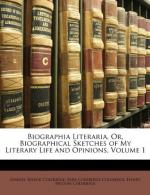
|
| Name: _________________________ | Period: ___________________ |
This test consists of 15 multiple choice questions and 5 short answer questions.
Multiple Choice Questions
1. What is the first emotion Coleridge says he does not understand toward him?
(a) Faith.
(b) Envy.
(c) Happiness.
(d) Hatred.
2. To Descartes, what was the body?
(a) Matter.
(b) Unintelligent.
(c) Intelligence.
(d) Naive.
3. How old was Coleridge when he read William Bowles?
(a) 17.
(b) 20.
(c) 25.
(d) 23.
4. What does Coleridge mention as Southey's writing?
(a) Novels.
(b) Essays.
(c) Song lyrics.
(d) Sonnets.
5. Wordsworth was first published when Coleridge was doing which of the following?
(a) Attending college.
(b) Attending high school.
(c) Writing a novel.
(d) Researching poets.
6. Where did Coleridge and Wordsworth first meet?
(a) Oxford.
(b) London.
(c) Bristol.
(d) Cambridge.
7. Which of the following did Coleridge mention he was interested in?
(a) Perception.
(b) Ideas.
(c) Thought.
(d) Painting.
8. In Chapter VI, Coleridge uses an example of a girl from which country?
(a) Mexico.
(b) Russia.
(c) China.
(d) Germany.
9. What did Southey experiment with often?
(a) Tone.
(b) Style.
(c) Metaphor.
(d) Form.
10. In Coleridge's example, why was the girl ranting and raving?
(a) She was anemic.
(b) She was schizophrenic.
(c) She had a fever.
(d) She was confused.
11. How many agents does Coleridge mention?
(a) 3.
(b) 5.
(c) 2.
(d) 7.
12. Coleridge thinks that pieces of recorded memory play, causing which of the following?
(a) Ranting.
(b) Naivety.
(c) Illness.
(d) Delirium.
13. Coleridge claims that chaos involves first working with which of the following?
(a) Sensations.
(b) Tastes.
(c) Sights.
(d) Sounds.
14. Coleridge feels it is natural to be jealous of who?
(a) Rivals.
(b) Family.
(c) Fans.
(d) Colleagues.
15. Coleridge claims that chaos involves second working with which of the following?
(a) Knowledge.
(b) Emotions.
(c) Feelings.
(d) Thoughts.
Short Answer Questions
1. What is the second task of the mind, according to Coleridge?
2. Ludovicus sought to explain the power of which of the following?
3. Coleridge feels he does not deserve which of the following that he has experienced?
4. Where was Kant from?
5. What does Coleridge describe as a work of beauty and elegance?
|
This section contains 287 words (approx. 1 page at 300 words per page) |

|




